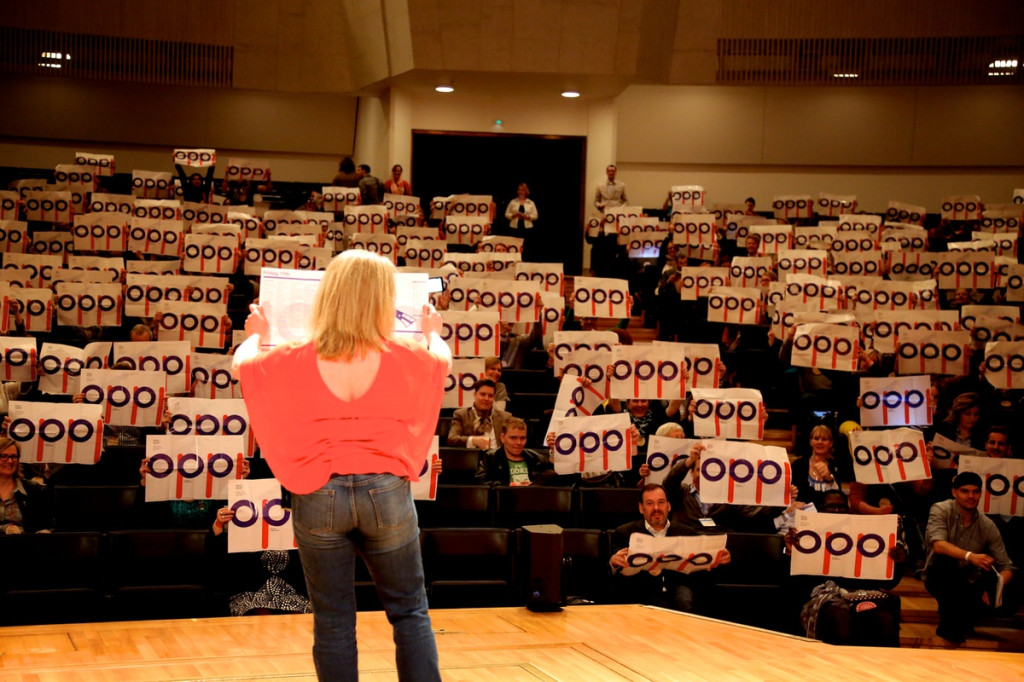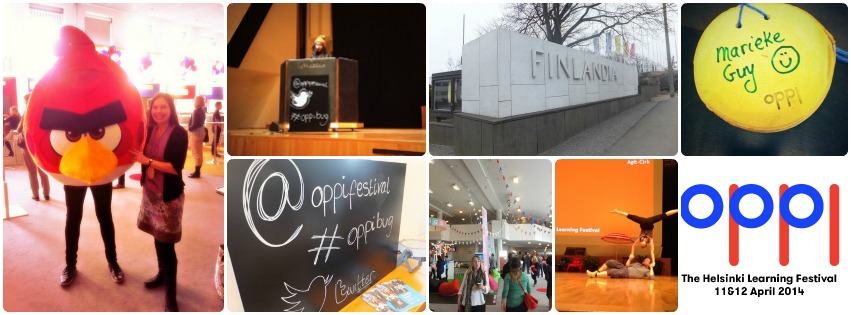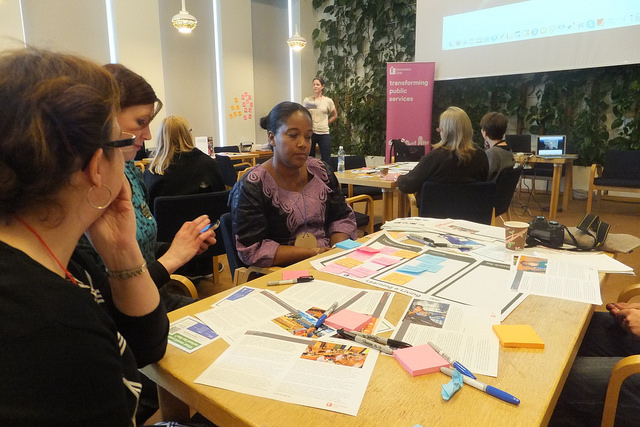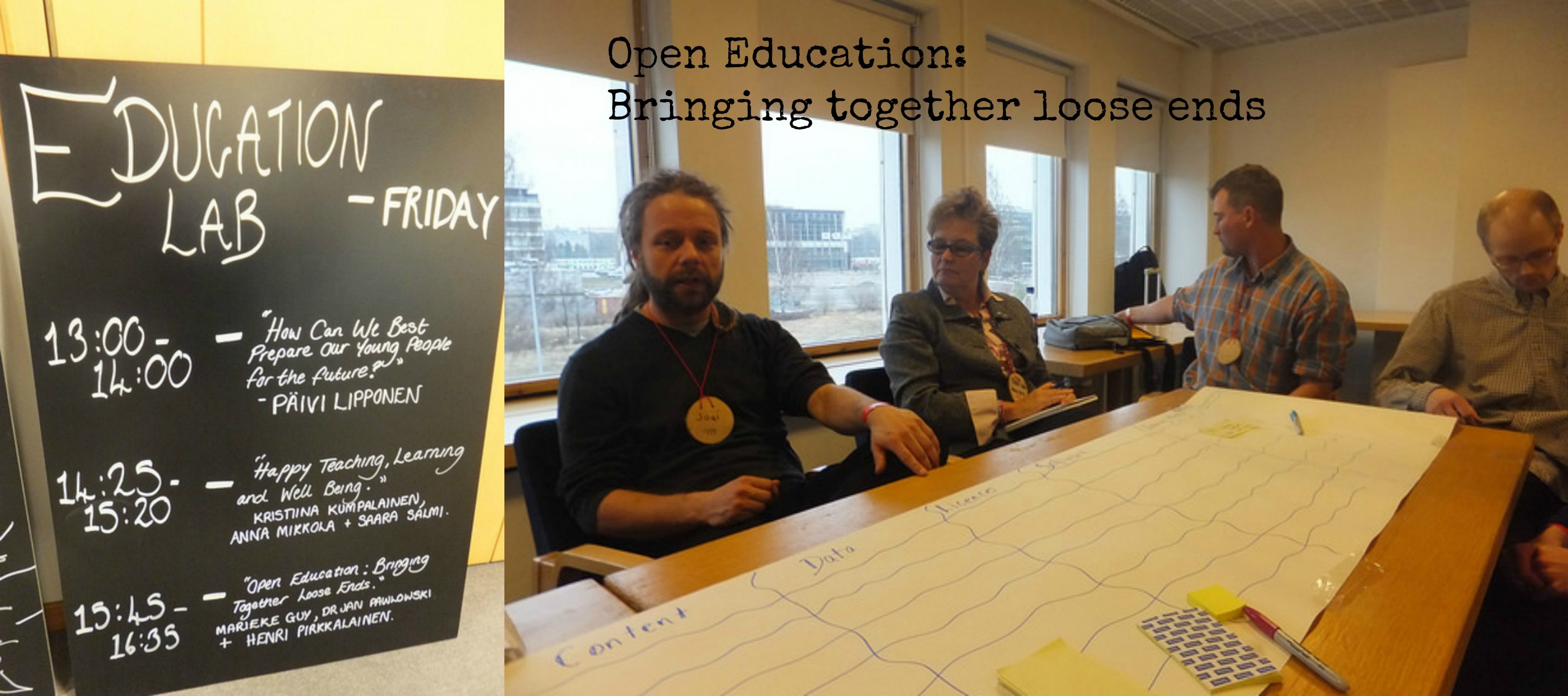Education OPPI-tunities
Last week saw the staging of OPPI – the Helsinki Learning Festival – in the Finlandia Hall, Helsinki, Finland.
Finland offers an ideal location in which to hold an event about learning. Its education system is regarded universally as being one of the best in the world. It scores incredibly highly on the Education Index and its performance in the Programme for international student achievement (Pisa) has been consistently excellent, though in 2013 the OECD rated it 12th, a significant drop on previous years. Finland’s scholarship success is often attributed to their uniform basic education system, which applies to all age groups, and the autonomy that individual schools retain. They also boast a competent and highly motivated teaching force. Sounds like they have it all worked out!
It was the first time OPPI had been held and it differed significantly from a traditional conference or workshop. Wikipedia describes a festival as in essence an event “staged by a local community” that “celebrates some unique aspect of that community”. OPPI felt both informal and flexible, and its programme and heart felt driven by the learning and teaching community. One of the #oppibug tweets referred to the OPPI attendees as ‘education-ophiles’; the attendees were more than that, they were those already doing in education. The majority were from schools, teachers and educators, but there were also learning technologies and policy makers.
There was so much to participate in and contribute to at OPPI but here are a few of my choicest themes.
Don’t rest on your laurels…
Simon Breakspear , Learning Strategist and founder of LearnLabs began by pointing out that despite Finland’s excellent reputation in the area of education “more of the same won’t cut it”. For education to continue to improve there is work to be done. So for example how can we solve the motivational divide and ensure those for whom education is a struggle are engaged? How can we do the ‘technology tango’ and carry out great teaching with our new technology tools, tools that don’t substitute teachers but empower.
Breakspear talked about new learning ecosystems, building compelling learning communities and students leading learning. However he concluded by pointing out that despite a changing world, relationships remain the killer app in education, and relationships need to be tended to.
Krista Kiuru, the Finnish Minister of Education & Science, also gave a nod to the need for the Finns to move onwards and upwards. She noted that Finland face significant education challenges and needs to innovate. Technology was seen as one of these challenges and despite the Finnish reputation for mobile there has been a tendency to not engage fully with technology in classrooms. It also seems Finland hasn’t cracked online yet. Former Finnish prime minister Esko Aho touched on this later when he commented that the debate about class sizes was now “completely outdated” when online lessons can have 1 student or 1 million students. Another challenge – Finland apparently has the largest inequality between boys and girls of any OECD country. Boys really struggle in many of the core subjects – different children need to be taught differently. Kiuru concluded by explaining that she believed in education rights, not international competition, and that as far as she was concerned education is the best heritage we can leave for young people.
Supporting the developing world
During OPPI there were some great sessions on how we can support others around the world using education innovation.
The Learning a Living session led by Louise Thomas, Education Programme Lead, Innovation Unit showcased inspiring examples of education innovation from around the world and included case studies on Big Picture Learning (US), La Bastilla School (Nicaragua) and Teach a Man to Fish (UK). There was an opportunity to break in to groups and discuss what we saw as the best practices from the case studies with a view to transferring approaches. It was clear that the common theme between these programmes was that they gave students autonomy, inspired innovation and used real-world activities to teach.
A later session entitled ‘Why are 65 million girls not going to school?’ was truly inspiring. The session opened with poems from Warsan Shire, Young Poet Laureate for London. Shire was born to Somalian parents and her family fled to the UK when she was young. Her poems talked about fear and loss for young people, clearly education could offer a way for some to break out of this cycle. During the panel session led by Naomi Williams from Plan International we were provided with so many breathtaking statistics, for example for every year you invest in a girl’s education you will see her income build 20%. However while access has improved for girls they just don’t stay in school for as long as boys, we need to try and get them to complete secondary education. The reasons for them dropping out are many and incredibly sad, from the need to stay at home and look after family, to abuse from male teachers.
Bringing in young people
On the morning of day 2 there was a panel session on the main stage entitled What’s the point of discussing the future of education without involving young people? This session led by student voice champion Gavin Dykes brought together Sarah Brown, co-founder of the A World at School initiative and some of her youth ambassadors – Lisa Goronga and Erin Lynch (these guys worked incredibly hard!). Apparently there are over 500 young ambassadors campaigning in more than 80 countries across the globe. A World at School aims to support the 57 million children who don’t have access to school and the millions more who are marginalised and may be in school but don’t get proper education. It was pointed out that 60% of 57 million kids not in schools are in 10 countries. A World at School was launched in 2013 and is now a movement of hundreds of thousands of people from more than 250 civil society, teacher, faiths, youth, business, international and non-governmental organisations. The arguments made during the session were very much around putting students at the centre when designing education systems – co-creation of learning opportunities.
It was so extremely refreshing to hear about education systems from those currently in them. The youth ambassadors talked of young people’s detachment from these system, problems caused by reluctance to deviate from curriculums and lack of engagement between teachers and students. It was clear that aligning the aspirations of children, the demands of parents, and the constraints of systems on a worldwide level is not an easy task. In a later discussion session Sarah Brown pointed out how in the UK the average term of minister of education in office is 22 months, this lack of continuity and perpetual short-sightedness leaves us short changed. The requirement is for long term propositions – potentially these long-term commitments come from partnerships outside of the political space.
At closing on day 1 we were treated to a talk from Signmark, the deaf Finnish rap artist. Signmark shared his experiences of being education as a deaf person. He now runs Teamhaloo which enables young people to express themselves through graffiti.
New ways of learning
Although open education was rarely mentioned by name at OPPI there was a definite undertone of the need for new and more open ways of working.
When answering a question about whether technology spells the end for bricks and mortar schools, Lisa Goronga (youth ambassador) explained that while she sees schools as being ‘pretty fantastic’ it is clear that they need significant tweaking and need to add ‘new ways of learning’. It was acknowledged that online technologies, in particular open ones, can bring learning to remote or economically poor locations.
One story that particularly touched a nerve was when Erin Lynch (youth ambassador) talked about a friend she has: a girl from she catches up with on Skype and talks Spanish with. Erin learns Spanish because she want to travel and get on in the world, the other girl from a rural South America town learns English because it will revolutionise her life. This girl walks for an hour to get to a cyber café where they have broadband just so she can learn. Erin reflected on this by pointing out that if we’re to get 57m more children into school it won’t be by replicating what’s been done in Finland and the UK. Education needs something new.
I was lucky enough to be able to run a brief hands-on workshop on open education on behalf of the Open Education Working Group. My co-hosts for the workshop were Jan Pawlowski and Henri Pirkkalainen from the University of Jyväskylän, Finland. Jan and Henri focused on their Open Educational Ideas Project while I worked on a mapping exercise where people shared their experience of open education related projects and initiatives and decided what facets of open education they covered. The activity was really interesting and I hope to share the results soon. What was clear though was that so many of those who are working at the coalface, educating and supporting learners, are not aware of open education as a concept. Not only this but those of us working in the open education space are not aware of the real-world activities of these people, often leading to the designing of new solutions that aren’t fit for purpose or needed. One example of this was the use of the TES lesson repository, the world’s largest collection of free teaching resources, potentially these resources could be utilised more as OERs. I hope to explore this more soon and cover it in the handbook.
I attended an interesting session on Collaboration: an essential ingredient for global education development led by Oliver Quinlan from NESTA and Gavin Dykes and joined by Sarah Brown and her youth ambassadors. The discussion was around the importance of having genuine collaboration between all sectors in order to best serve global educational development. During the session, while many saw learning as fundamentally collaboratively, it became apparent that calling for collaboration is not enough. There are so nmany difficult to answer questions: How do you get collaboration from business? How do you engage different communities? What about the different agendas of players? Can you collaborate in a world of competition? Is it just in the overlapping areas where you work together? One audience member pointed out that with collaboration there is an assumption that everyone wants to do it and that everyone knows how to do it. His suggestion was that we need tolerance, humility and transparency. Others agreed that collaboration is easier when organisations have clear goals. Again all areas of interest for open education.
To conclude…
There were so many take homes from OPPI and having scanned a few other blog posts I see that people got very different things out of it. Possibly the biggest three for me were around being optimistic (but in a measured way), the importance of teaching and finally the need to hear other voices.
Many years of working with and around technology have made me a little immune to it. So Angry Birds now want a taste of the learning pie and gamification is all the rage. I’ve seen these things before. Enthusiasm for technology is good, and definitely needed, but education is much more. So while we need to be optimistic and enthusiastic about the potential of technology we should note that education is still about teaching – or maybe more specifically connection. In the last slot on Friday we saw Sugata Mitra talk (albeit as an ipad) about his Hole in the Wall experiment. Many had seen his talk before and there was a definite undercurrent of concern about Mitra’s attitude to teachers. Does Hole in the Wall suggest no need for teachers? This didn’t seem to be the case, though Mitra’s suggestion that teachers be a friend was interpreted in a number of different ways. However his idea that we question the notion of teachers as ‘the expert’ met with more approval. Education today is even more so about ‘teaching’ – though teaching now means something different from a solitary figure in the front of the class, it means support and collaboration.
I felt that many of the interactions I had and witnessed at OPPI indicated a very real-world need for open education. It may not be open education by that particular name (I saw references to Open Source Education and sharing education, along with new ways of working), but is still open approaches to education that breaks down barriers.
A comment in my post OPPI email from Suklaa.org – the event organisers – put it nicely.
“The responses to the festival that have come in so far have told us that participants welcome this event and the concept of bringing together multiple industries and voices to debate and shape the future of education is necessary.“
Multiple voices give us a more rounded perspective – always worth having! And Suklaa think there will definitely be another OPPI next year – I’ll raise my glass to that!
 Open Education Working Group
Open Education Working Group 







Leave a Reply